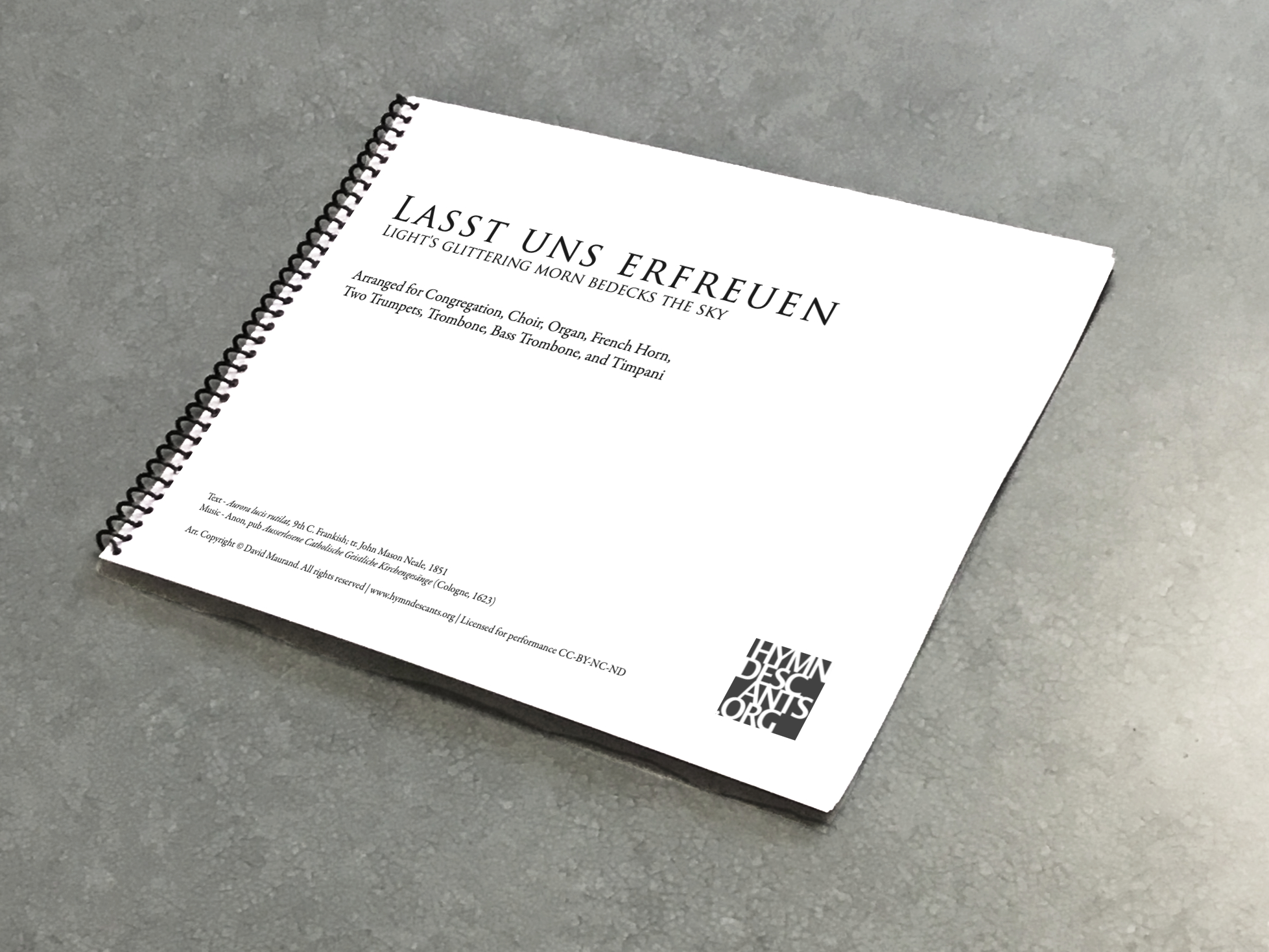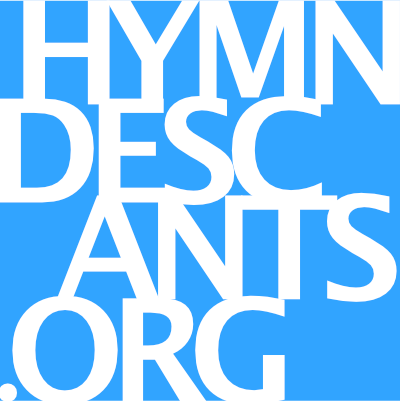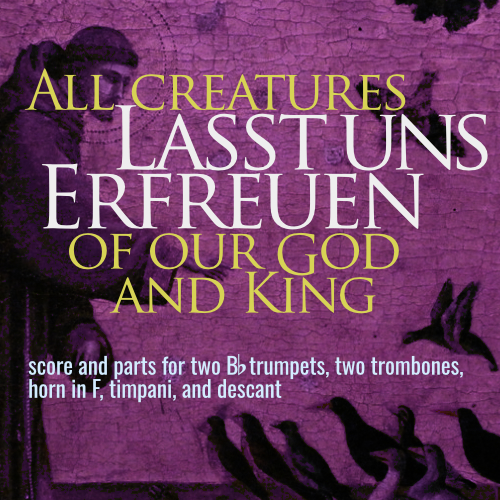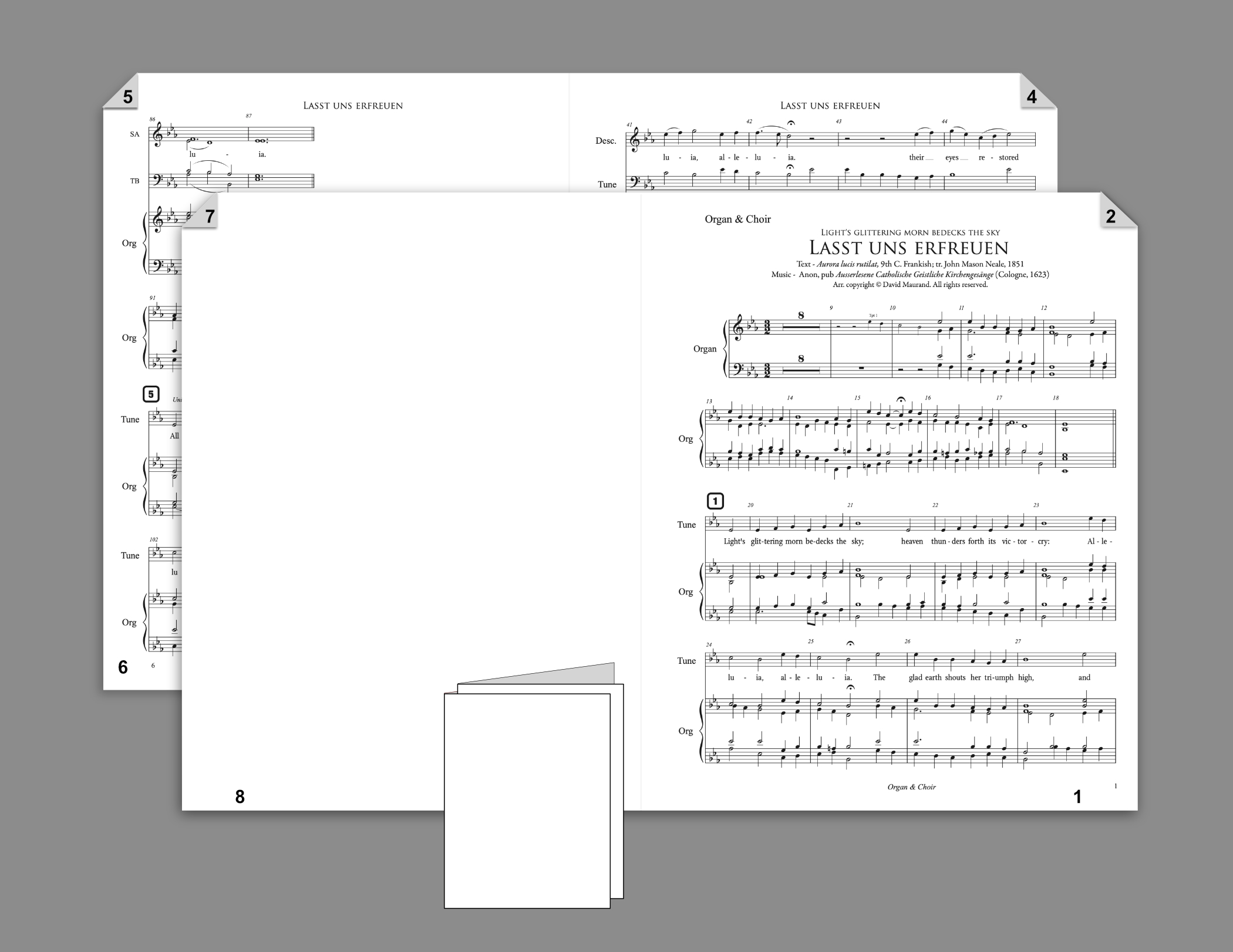Lasst uns erfreuen (ACGK)
All creatures of our God and king
Brass quintet, timp, organ, choir, and congregation
Seven verse arrangement of All Creatures of our God and King, an adaptation of Canticle of the Sun by St. Francis of Assissi (1225). Very few hymnals use the same text as any other hymnal, yet these dialectic differences have done little to dampen the affection worshippers feel for St. Francis' hymn and sensibility. The tune was the setting for the Easter hymn, Lasst uns erfreuen herzlich sehr, an anonymous tune which first appeared in the Jesuit hymnal Ausserlesene Catholische Geistliche Kirchengesänge (Cologne, 1623, ed. Friedrich Spee, which quotes antecedents).
Price:
$35.00
Born the son of a wealthy merchant, Giovanni di Pietro di Bernardone was given the name Francesco (Frenchman) by his father following a trip to France. After a comfortable youth, he joined one of the innumerable wars between Italian city-states, eventually enduring injury, capture, and imprisonment. Following his release, he began to grow disillusioned with the life of material wealth - and in his early 20’s, joined a pilgrimage to Rome where he associated with the poor, begging at the doors of St. Peter’s. Upon return, he withdrew to the countryside, and now within proximity to the decrepit church of San Damiano, he began to rebuild it himself, stone by stone, the material needs for the project acquired through begging. Within two years, Francesco d’Assissi mission grew to 11 friars (brothers; none were fathers, ie, priests) and in 1209 traveled to Rome with their simple rule, seeking the Pope’s authority to found a mendicant order.
Canticle of the Sun was written in Francis’ native Umbrian dialect - not Latin - based on Psalm 148, the third verse of which is “Praise ye him, sun and moon: praise him, all ye stars of light” (KJV). Francis hymn is a lauda, a song of praise written in the vernacular for use outside the church, and includes verses translated “Be praised, my Lord, through all your creatures, especially through my lord Brother Sun” and “Praised be You, my Lord, through Sister Moon and the stars.” It would be nearly 700 years before William Draper paraphrased the hymn in English verse, originally for use with children.
This tune was the setting for the Easter hymn, Lasst uns erfreuen herzlich sehr, which celebrates the resurrection narrative from the perspective of Mary. It first appeared in the Jesuit hymnal Ausserlesene Catholische Geistliche Kirchengesänge (Cologne, 1623, ed. Friedrich Spee), and the setting quickly produced variants regarding the distribution of the alleluias. German literature usually attributes authorship of both the text and the tune to the collection's editor. As a poet and hymnologist, the attribution to him of the text is plausible; however there are no first-hand references to support an assertion of musical composition. Moreover, the opening phrase can be found in a tune 100 years earlier attributed to Matthäus Greiter and adapted to GENEVAN 36 and 68, published in 1525. Authoritative English language sources are devoid of the attribution. Originally rendered in common time, Ralph Vaughan Williams' harmonization rendered the music in the now more familiar 6/4 for the 1906 English Hymnal.
References
Canticle of the Sun, Wikipedia (retr. 2021)
Christianity Today: Francis of Assisi: Mystical founder of the Franciscans
Version 9.4.4
- Reconciled with other editions
- Score recast in US LTR landscape
- Additional harmonization for this seven verse treatment
- Voice leading refinements at the cadence (esp. Trumpets and Organ)
- Measure numbers properly account for split-measure anacruses
Previous Versions
Version 9.3.3
- Score changed to 8-1/2 x 11 landscape (was 8-1/2 x 14 legal)
- Organ score (with choir part) 8-12 x 11 potrait single pages*
- Choir imposed for 8-page layout on 11x17 duplex printer -copier*
- Minor voice leading changes
* the individual pages of both are identical, with optimized page turns
Version 9.2.2
- Shorter prologue (P2)
- Minor voice leading revisions
- Improved parts layout
- Vocal part prints duplex 11x17
All creatures of our God and King also updated
Version 9.1.1
- Reissued with new score/part styles (legibility) 2021
- Revises cadence to lower penultimate note in descant
- Voice leading revisions brass instruments
- Correction to descant to remove a parallel
- Adds All Creatures of our God and King
1 Instrumental
All creatures of our God and King,
lift up your voices, let us sing:
alleluia, alleluia!
Bright burning sun with golden beams,
Pale silver moon that gently gleams,
O praise him, O praise him,
Alleluia, alleluia, alleluia!
2 Organ RVW
Great rushing winds and breezes soft,
you clouds that ride the heavens aloft,
O praise him, Alleluia!
Fair rising morn, with praise rejoice,
stars nightly shining, find a voice:
O praise him, O praise him,
Alleluia, alleluia, alleluia!
3 Organ (new harmonization a)
Swift flowing water, pure and clear,
make music for your Lord to hear,
Alleluia, alleluia!
Fire, so intense and fiercely bright,
you give to us both warmth and light,
O praise him, O praise him,
Alleluia, alleluia, alleluia!
4 Descant and Organ (new harmonization b)
Dear mother earth, you day by day
unfold your blessings on our way;
O praise him, Alleluia!
All flowers and fruits that in you grow,
let them his glory also show:
O praise him, O praise him,
Alleluia, alleluia, alleluia!
5 Organ (new harmonization c)
All you with mercy in your heart,
forgiving others, take your part,
O sing now: Alleluia!
All you that pain and sorrow bear,
praise God, and cast on him your care:
O praise him, O praise him,
Alleluia, alleluia, alleluia!
6 Organ (new harmonization d)
And even you, most gentle death,
waiting to hush our final breath,
O praise him, Alleluia!
You lead back home the child of God,
for Christ our Lord that way has trod:
O praise him, O praise him,
Alleluia, alleluia, alleluia!
7 Instrumental
Let all things their creator bless,
and worship him in humbleness,
O praise him, Alleluia!
Praise God the Father, praise the Son,
and praise the Spirit, Three in One:
O praise him, O praise him,
Alleluia, alleluia, alleluia!
a letter-size coil bound score of 15 pages will cost less than $10 at Staples. You can order online and upload the files with out an account - check out as guest. Paper handling for the included eight-page choir part pictured further below.
The eight-page signature version of the choir part is laid out ready to print in duplex mode short edge priority on 11x17 Ledger paper. This is a common feature of most office-grade printer copiers, but Staples can also do this for you as well.




